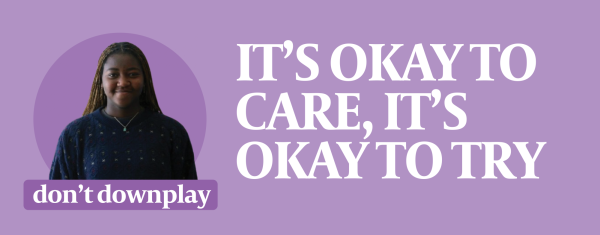A Lesson to Learn: After the recent lawsuit from the Teens for Life poster, administrators should learn from the mistakes made.
More in Perspectives
Between Feb. 23 and March 9, as a large pro-life poster hung in the main cafeteria, a conversation sparked among the students of CHS, and a question was raised: Why was a pro-life poster allowed to hang up without a poster displaying the argument from the other side? I asked the same question, as I hoped to see both sides of the issue, but quickly learned that administrators did not allow a pro-choice poster, causing controversy among the school. However, specifics of this issue aside, this discrepancy raised a larger question: What voice do students actually have and through what means can they share that voice?
In 1965, a group of students decided to wear black armbands to school in protest of the Vietnam War, only to be suspended and not allowed back to school until they agreed not to wear the armbands. These students took this case to the Supreme Court, which ruled in favor of the students, leading to the infamous Tinker v. Des Moines decision, which is still used across the nation today. The court ruled that public school officials can only “prohibit students from wearing symbols of political views within school premises where the symbols are not disruptive of school discipline or decorum.”
This case was a win for freedom of speech and expression within schools, but even to this day, the word “disruptive” has led to many arguments. What qualifies as “disruptive” and how is that to be decided?
The armbands in the Tinker v. Des Moines case were not harming anyone or promoting harmful messages; rather, they were simply showcasing a political viewpoint and spurring a conversation among the school’s students and faculty. The pro-life poster at CHS has done the exact same thing. It presented one side of a polarizing topic to start a discussion that many often shy away from in fear they will offend their peers. It did not create a disruption, but was rather simply a means of sharing ideas.
A school is a place for fostering healthy discussion, not suppressing it. However, following arguments about the pro-life poster, the administration was quick to change their club signage policy, so that students are now extremely confined on what they can or cannot put on a poster and are no longer allowed to share their political ideologies. By disallowing posters on these different viewpoints, the administration is censoring necessary conversations and is thus restricting the education of the student body on issues seldom discussed in the classroom, going against the very purpose of a school.
With over 5,000 students at CHS, we have a school with thousands of different views and ideas, giving us the opportunity to learn and listen and begin new dialogues. Yet, this often does not happen and controversial topics are avoided within the school walls. Rather than promote this avoidance, the administration should encourage students to share their voices and allow opposing opinions to be heard by the entire student body. The Teens for Life poster put an opinion out there for all to see and got everyone talking about the issue of abortion, not causing any disruption, instead creating a new discourse that is rarely found within our walls. Through its policies, the school is not only sponsoring a culture of evading these truly essential conversations, but also denying students of their right to the First Amendment and allowing their individual voices to be heard.
This poster was never simply about abortion or the opinion of a group of students. It was about opening the doors for students and faculty alike to talk and listen and share ideas. It was about changing the way we, as a school, handle contentious dialogue. So now, going forward, let’s start talking and listening and sharing ideas. Let’s not avert from certain topics in fear they will be too offensive. Let’s create an environment that is open to all perspectives. It is only when we do this that we will be able to live in a world in which everyone doesn’t hide behind their own bubbles, but alternatively accepts and listens to others, allowing us to foster healthy debates and come up with the best possible solutions to our problems.
Your donation will support the student journalists of Carmel High School - IN. Your contribution will allow us to purchase equipment and cover our annual website hosting costs.

































![AI in films like "The Brutalist" is convenient, but shouldn’t take priority [opinion]](https://hilite.org/wp-content/uploads/2025/02/catherine-cover-1200x471.jpg)









































![Review: “The Immortal Soul Salvage Yard:” A criminally underrated poetry collection [MUSE]](https://hilite.org/wp-content/uploads/2025/03/71cju6TvqmL._AC_UF10001000_QL80_.jpg)
![Review: "Dog Man" is Unapologetically Chaotic [MUSE]](https://hilite.org/wp-content/uploads/2025/03/dogman-1200x700.jpg)
![Review: "Ne Zha 2": The WeChat family reunion I didn’t know I needed [MUSE]](https://hilite.org/wp-content/uploads/2025/03/unnamed-4.png)
![Review in Print: Maripaz Villar brings a delightfully unique style to the world of WEBTOON [MUSE]](https://hilite.org/wp-content/uploads/2023/12/maripazcover-1200x960.jpg)
![Review: “The Sword of Kaigen” is a masterpiece [MUSE]](https://hilite.org/wp-content/uploads/2023/11/Screenshot-2023-11-26-201051.png)
![Review: Gateron Oil Kings, great linear switches, okay price [MUSE]](https://hilite.org/wp-content/uploads/2023/11/Screenshot-2023-11-26-200553.png)
![Review: “A Haunting in Venice” is a significant improvement from other Agatha Christie adaptations [MUSE]](https://hilite.org/wp-content/uploads/2023/11/e7ee2938a6d422669771bce6d8088521.jpg)
![Review: A Thanksgiving story from elementary school, still just as interesting [MUSE]](https://hilite.org/wp-content/uploads/2023/11/Screenshot-2023-11-26-195514-987x1200.png)
![Review: "When I Fly Towards You", cute, uplifting youth drama [MUSE]](https://hilite.org/wp-content/uploads/2023/09/When-I-Fly-Towards-You-Chinese-drama.png)
![Postcards from Muse: Hawaii Travel Diary [MUSE]](https://hilite.org/wp-content/uploads/2023/09/My-project-1-1200x1200.jpg)
![Review: "Ladybug & Cat Noir: The Movie," departure from original show [MUSE]](https://hilite.org/wp-content/uploads/2023/09/Ladybug__Cat_Noir_-_The_Movie_poster.jpg)
![Review in Print: "Hidden Love" is the cute, uplifting drama everyone needs [MUSE]](https://hilite.org/wp-content/uploads/2023/09/hiddenlovecover-e1693597208225-1030x1200.png)
![Review in Print: "Heartstopper" is the heartwarming queer romance we all need [MUSE]](https://hilite.org/wp-content/uploads/2023/08/museheartstoppercover-1200x654.png)











